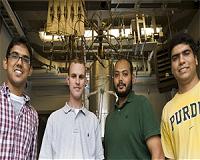 |
Cambridge MA (SPX) Sep 17, 2010 Joule Unlimited has announced the issuance of a U.S. patent covering its breakthrough conversion of sunlight and waste carbon dioxide (CO2) directly into liquid hydrocarbons that are fungible with conventional diesel fuel. Unlike biofuel processes that require costly intermediates such as sugar, algal or agricultural biomass, Joule is the first to achieve and patent a direct, single-step, continuous process for the production of hydrocarbon fuels requiring no raw material feedstocks - setting the stage for fossil fuel replacement at unprecedented efficiencies and costs as low as $30 per barrel equivalent. U.S. Patent #7,794,969, titled "Methods and Compositions for the Recombinant Biosynthesis of n-Alkanes," covers the use of engineered photosynthetic microorganisms for the direct synthesis of diesel molecules. Joule's microorganisms function as biocatalysts that use only sunlight, waste CO2 and non-fresh water to directly and continuously produce diesel-range hydrocarbons, which are chemically distinct from biodiesel and are compatible with existing infrastructure. This landmark achievement in industrial bioprocessing clears the path for large-scale renewable fuel production, addressing the cost, resource constraints and energy-intensive steps associated with biomass growth, harvesting, extraction and refining to reach an end product. The entire process produces more net energy than it consumes and yields sulfur-free, ultra-clean diesel. "This patent award represents a critical milestone for our IP strategy and validates the truly revolutionary nature of our process, which has the potential to yield infrastructure-compatible replacements for fossil fuels at meaningful scale and highly-competitive costs, even before subsidies," said Bill Sims, President and CEO, Joule. "Our vision since inception has been to overcome the limitations of biomass-based technologies, from feedstock costs and logistics to inefficient, energy-intensive processing. The result is the world's first platform for converting sunlight and waste CO2 directly into diesel, requiring no costly intermediates, no use of agricultural land or fresh water, and no downstream processing." Joule's advances in biology are one critical aspect of the company's integrated Helioculture platform, which also incorporates process, materials, photonic and thermal engineering to create an optimal system for the efficient production of fuels and chemicals. Joule's novel SolarConverter system has been developed to maximize photon-to-fuel conversion efficiency, and features a modular, scalable design for ease of deployment, dependent only on land and waste CO2 availability. The integrated platform will enable productivities above any other closed-system approach, with a commercial target of 15,000 gallons of diesel per acre annually. Joule has already proven the direct production of diesel, and will begin pilot production by the end of 2010. The company has also proven the direct production of ethanol via the same process at a rate of 10,000 gallons/acre/year, 40% of its ultimate productivity target, and pilot operations are underway in Leander, Texas. Since inception Joule has pursued a strong IP position, operating in "stealth mode" for its first two years as patent applications were filed. Joule's IP portfolio now includes two issued U.S. patents and numerous patent filings resulting from more than three years of on-going development, covering its core technologies, system and integrated process. The company's first patent, U.S. Patent #7,785,861, "Hyperphotosynthetic Organisms," relates to aspects of an engineered photosynthetic microorganism for fuel production, and was granted on August 31, 2010.
Share This Article With Planet Earth
Related Links Joule Unlimited Bio Fuel Technology and Application News
 Synthetic Fuels Research Aims To Reduce Oil Dependence
Synthetic Fuels Research Aims To Reduce Oil DependenceWest Lafayette IN (SPX) Sep 16, 2010 Researchers at Purdue University have developed a facility aimed at learning precisely how coal and biomass are broken down in reactors called gasifiers as part of a project to strengthen the scientific foundations of the synthetic fuel economy. "A major focus is to be able to produce a significant quantity of synthetic fuel for the U.S. air transportation system and to reduce our dependen ... read more |
|
| The content herein, unless otherwise known to be public domain, are Copyright 1995-2010 - SpaceDaily. AFP and UPI Wire Stories are copyright Agence France-Presse and United Press International. ESA Portal Reports are copyright European Space Agency. All NASA sourced material is public domain. Additional copyrights may apply in whole or part to other bona fide parties. Advertising does not imply endorsement,agreement or approval of any opinions, statements or information provided by SpaceDaily on any Web page published or hosted by SpaceDaily. Privacy Statement |